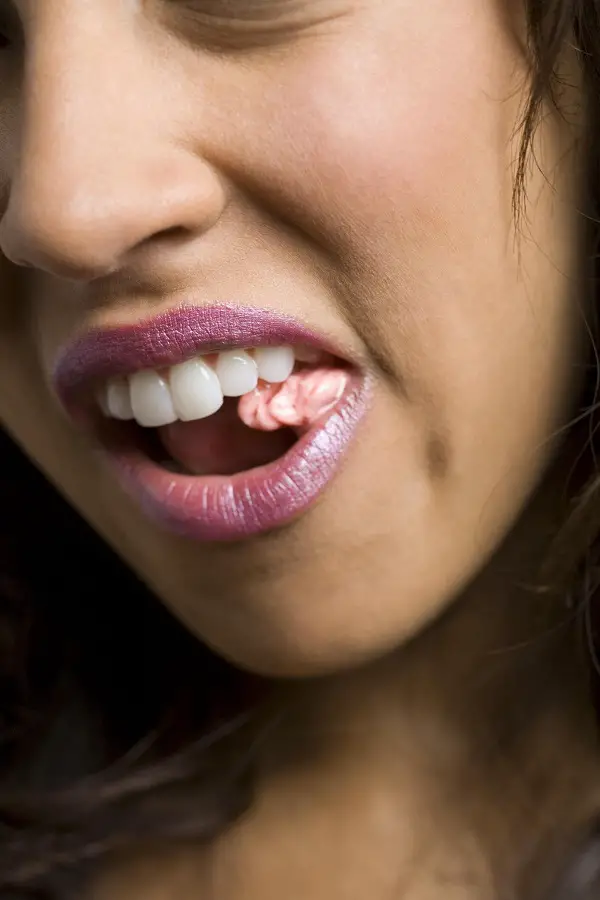Last Updated on January 6, 2025
Yes, it is safe to chew gum during your pregnancy, but it’s essential to choose sugar-free options to protect your oral health. During pregnancy, many women experience gum swelling and sensitivity due to hormonal changes.
Chewing sugar-free gum can help increase saliva production, which counteracts acidity in the mouth and helps prevent tooth decay and gum disease. It can also provide temporary relief from nausea or morning sickness. However, it’s important to consult with your healthcare provider before introducing any new habits during pregnancy.
We will explore the benefits and potential risks of chewing gum while pregnant, as well as provide additional tips for maintaining good oral health throughout this crucial period.

The Risks Of Gum Chewing During Pregnancy
Chewing gum during pregnancy can pose potential risks. It’s important to consider ingredients like artificial sweeteners and the potential for gum to increase swallowing excess air which can lead to discomfort.
Chewing Gum: An Overview
Chewing gum has been a popular habit for many people, offering a range of benefits such as freshening breath, reducing stress, and improving concentration. However, when it comes to pregnancy, it’s essential to understand the potential risks associated with gum chewing.
In this section, we will explore why pregnant women chew gum, the potential risks involved, and the impact of chewing gum ingredients on pregnancy.
Why Do Pregnant Women Chew Gum?
During pregnancy, hormonal changes can often result in increased saliva production, leading some women to seek relief by chewing gum. Additionally, pregnant women may turn to gum chewing to alleviate nausea or mask undesirable tastes caused by hormonal fluctuations. It’s important to note that while gum chewing can offer temporary relief, understanding the potential risks is crucial for maintaining a healthy pregnancy.
Potential Risks Associated With Gum Chewing During Pregnancy
While there is limited research specifically focusing on the risks of gum chewing during pregnancy, it is important to be aware of potential concerns. Here are the potential risks associated with gum chewing during pregnancy:
- Intake of artificial sweeteners: Many gum brands contain artificial sweeteners such as aspartame, sucralose, or saccharin, which have been linked to health concerns. While the FDA considers these sweeteners safe in moderate amounts, it’s recommended to consume them in moderation during pregnancy.
- Digestive issues: Excessive gum chewing can lead to swallowing excessive air, causing bloating, gas, and discomfort. Pregnant women already prone to digestive issues may experience exacerbated symptoms.
- Jaw problems: Frequent gum chewing can exert additional pressure on the jaw joint, potentially leading to temporomandibular joint (TMJ) pain or aggravating existing jaw issues.
- Choking hazard: Gum can be a choking hazard, especially in later stages of pregnancy when the growing uterus may exert pressure on the diaphragm, making it difficult to breathe properly.

Impact Of Chewing Gum Ingredients On Pregnancy
Considering the potential risks, it’s essential to examine the impact of chewing gum ingredients on pregnancy. Here are some common ingredients in gums and their impact:
- Artificial sweeteners: As mentioned earlier, artificial sweeteners can be a concern during pregnancy. While small amounts are generally considered safe, it’s advisable to limit excessive consumption.
- Sugar: Gum that contains sugar can contribute to dental issues such as cavities or gum disease. It’s important to maintain good oral hygiene practices, including regular brushing and flossing, to minimize potential complications.
- Caffeine: Some gum brands may contain caffeine, which is a stimulant not recommended in high quantities during pregnancy. It’s advisable to check product labels for caffeine content or switch to caffeine-free options.
While chewing gum can offer temporary relief for pregnant women, it’s crucial to understand the potential risks and impact of ingredients. It’s always wise to consult with your healthcare provider for personalized advice regarding gum chewing during pregnancy.
Health Benefits And Concerns Of Chewing Gum While Pregnant
Chewing gum during pregnancy comes with potential health benefits and concerns. Some studies suggest that it may alleviate morning sickness and improve digestion, but excessive consumption could lead to jaw pain and contribute to tooth decay. It’s best to consult with your healthcare provider before incorporating gum into your pregnancy routine.
Pregnancy can bring about many changes in a woman’s body, and with it comes the need for additional care and precautions. One of the questions that often arises is whether it is safe to chew gum during pregnancy. Let’s explore the health benefits and concerns of chewing gum while pregnant.
Benefits Of Chewing Gum During Pregnancy:
- Relieves nausea: Many pregnant women experience bouts of morning sickness and nausea. Chewing gum, especially flavors like peppermint or ginger, can help alleviate these symptoms and provide relief.
- Improves digestion: Hormonal changes during pregnancy can lead to indigestion and bloating. Chewing gum stimulates the production of saliva, which aids in the digestion process and helps reduce discomfort.
- Oral health benefits: Chewing sugar-free gum stimulates saliva flow, which can help prevent dental issues like cavities and gum disease. It also cleanses the mouth by removing food particles and acids.
Is Sugar-Free Gum Better For Pregnant Women?
Pregnant women are often advised to choose sugar-free gum over regular gum. Here are some reasons why sugar-free gum may be a better choice during pregnancy:
- No added sugars: Sugar-free gum is sweetened with artificial sweeteners, which do not contribute to tooth decay or gestational diabetes, a condition that can develop during pregnancy.
- Lower calorie intake: Sugar-free gum can be a guilt-free way to satisfy cravings without adding extra calories to the diet.
- Reduced risk of cavities: Avoiding sugar-laden gum reduces the risk of developing cavities, which pregnant women are more susceptible to due to hormonal changes.
Potential Health Concerns Of Chewing Gum While Pregnant:
While chewing gum can have its benefits, there are a few concerns that pregnant women should be aware of:
- Jaw discomfort: Excessive chewing can lead to jaw discomfort or temporomandibular joint (TMJ) issues. It is important to chew gum in moderation and take breaks if any discomfort arises.
- Allergic reactions: Some pregnant women may be allergic to certain ingredients in gum, such as artificial sweeteners or flavorings. If any allergic reactions occur, it is best to avoid chewing gum altogether.
- Avoiding excessive caffeine: Some gum brands contain caffeine, which can increase heart rate and blood pressure. Pregnant women should be cautious and opt for caffeine-free gum to minimize any potential harm.
It is crucial to consult with a healthcare professional before introducing any new habits during pregnancy, including chewing gum. They can provide personalized advice based on your unique circumstances to ensure the safety and well-being of both you and your baby.
Remember, moderation is key, and it’s always better to make informed choices when it comes to your health.
Best Practices For Safe Gum Chewing During Pregnancy
Chewing gum during pregnancy is generally safe when done in moderation. However, it is important to choose sugar-free options to prevent dental issues. Additionally, be cautious of potential choking hazards and stick to soft gums that are easy to chew.
Chewing gum during pregnancy can be a satisfying way to freshen your breath and combat nausea. However, it’s essential to choose pregnancy-friendly gum brands and follow expert recommendations to ensure it’s safe for you and your baby. Here are some best practices for safe gum chewing during pregnancy:
Recommendations From Experts
- Consult your healthcare provider: Before incorporating gum chewing into your routine during pregnancy, it’s always recommended to consult with your healthcare provider. They can provide personalized advice based on your specific health conditions and pregnancy status.
- Opt for sugar-free gum: When selecting gum brands, it’s crucial to choose sugar-free options. Regular gum often contains high amounts of sugar, which can contribute to dental issues and weight gain. Sugar-free gum, on the other hand, can be a healthier alternative that doesn’t harm your teeth or jeopardize your blood sugar levels.
- Look for xylitol as the sweetener: Xylitol is a naturally occurring sweetener that helps fight tooth decay. It has been deemed safe for pregnancy consumption by experts. Check the ingredients list to ensure the gum you choose contains xylitol as a sweetener.
- Avoid artificial sweeteners: While xylitol is considered safe, some artificial sweeteners, such as saccharin and aspartame, should be avoided during pregnancy due to potential risks. Always read the label carefully and steer clear of these sweeteners to prioritize your baby’s health.
- Limit the amount and frequency: Chewing gum excessively can lead to excessive swallowing of air, which can cause bloating and gas. To avoid these discomforts, limit the amount and frequency of gum chewing during pregnancy. It’s best to enjoy gum in moderation rather than making it a constant habit.
How To Choose Safe And Pregnancy-Friendly Gum Brands
- Read the label: Before purchasing any gum brand, read the label to check for ingredients and nutritional information. Ensure the gum is sugar-free and contains xylitol as a sweetener.
- Consider natural and organic options: Some gum brands offer natural and organic options that are free from artificial ingredients, flavors, and chemicals. These can be a healthier choice during pregnancy, reducing your exposure to potentially harmful substances.
- Seek recommendations: Talk to your dentist or other healthcare professionals for their recommendations on safe gum brands for pregnant women. They may have specific brands they trust and recommend to their patients.
Alternatives To Gum Chewing For Pregnant Women
- Sugar-free mints: Instead of chewing gum, opt for sugar-free mints to freshen your breath. Like sugar-free gum, they can provide a similar refreshing effect without the need for chewing.
- Natural breath fresheners: You can also consider natural breath fresheners, such as herbal sprays or essential oil-infused mists. These can offer a pleasant aroma while avoiding any concerns related to gum ingredients.
- Oral hygiene practices: Maintaining good oral hygiene, including regular brushing, flossing, and rinsing with mouthwash, can go a long way in keeping your breath fresh and your mouth healthy during pregnancy.
Remember, while chewing gum can provide certain benefits during pregnancy, moderation and selecting the right gum brands are key. Prioritize your health and consult with your healthcare provider for personalized advice.
Frequently Asked Questions For Is It Safe To Chew Gum During Your Pregnancy?
Is It OK to Eat Chewing Gum While Pregnant?
Yes, it is safe to eat chewing gum while pregnant.
Does Chewing Gum Help Pregnancy Sickness?
Chewing gum may help with pregnancy sickness, but it’s not a guaranteed solution.
Is Peppermint Chewing Gum Good For Pregnancy?
Peppermint chewing gum is safe during pregnancy and can help alleviate nausea and freshen breath.
When Should You Not Chew Gum?
Avoid chewing gum when you have dental work, jaw problems, or are in a professional or social setting.
Can You Chew Gum While Pregnant?
Yes, you can chew gum during your pregnancy. However, it’s important to choose sugar-free gum to protect your oral health.
Conclusion
The safety of chewing gum during pregnancy is a topic that requires careful consideration. While gum chewing can have its benefits, such as relieving nausea and aiding digestion, it is essential to choose sugar-free options to avoid potential dental problems and unnecessary weight gain.
Additionally, excessive consumption of artificial sweeteners, especially those containing xylitol, should be avoided due to potential adverse effects on fetal development. It is always advisable to consult with your healthcare provider before making any dietary changes during pregnancy. Maintaining good oral hygiene, staying hydrated, and adopting a well-balanced diet are crucial for the overall health of both the mother and the baby throughout this special journey.
Remember, every pregnancy is unique, and it’s important to prioritize your well-being while making choices that align with your individual needs and circumstances.











